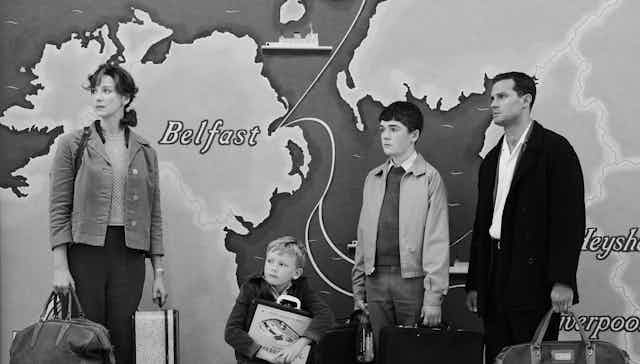Kenneth Branagh’s latest semi-autobiographical film, Belfast, is set in Northern Ireland in 1969 and explores the “social and political tumult” in the buildup to the Troubles. The “affectionate portrait” of nine-year-old Buddy lies at the centre of this film, critic Robbie Meredith noted. Yet as violence begins to escalate between communities in Belfast, Buddy’s small world begins to rupture and his family is forced to make some hard decisions.
The film’s release provides a timely prompt to examine the experience of those that lived through such a turbulent time in Northern Ireland. A period brought into sharp relief by renewed debates over borders on the island.
The Troubles (1969-98) were primarily fought between three parties: Republican paramilitaries who sought the unity of Northern Ireland with the Republic of Ireland; Loyalist paramilitaries who strove to defend the union of Northern Ireland with the United Kingdom; and forces of the British state. Despite the signing of the Good Friday agreement (which outlined the terms of peace in 1998), many aspects of Northern Ireland’s past remain contested, including the historical roots and causes of division that led to the escalation of violence in 1969.
Approaches to peacebuilding in Northern Ireland have been underpinned by widespread attempts to deal with the conflict’s legacy and its ongoing effect on people’s lives. One approach undertaken by grassroots communities and NGOs in the peace process has been to reflect on the past through storytelling. Community oral history emerged as an empowering medium to acknowledge and preserve people’s experiences. One such initiative is the Dúchas Oral History Archive located in Falls Community Council, West Belfast – one of the worse affected areas.
Complex relationships
Documenting a diverse social and cultural history of Belfast from around the 1910s to the present day, Dúchas has helped people from various backgrounds tell their stories about the conflict since 2000. The stories are from, among others, Nationalist/Catholic, Unionist/Protestant and British soldier perspectives. The collection holds over 300 life history interviews, with some excerpts published.
Sometimes, as the interviews were often conducted between people who knew each other, the process of looking back evoked antagonistic memories of the conflict that reflected ongoing tensions in the peace process. But Dúchas also preserved the memories of those whose experiences conjured memories of connectedness with neighbours across religious and political divisions, as one interviewee described:
…the first time that I ever knew that there was a difference [was] because I overheard my mammy saying that Mrs Shannon had decided to move down to Cushendall, with everything that was going on, and my mammy was saying, “I’m losing a really good neighbour, and it’s ridiculous, just because she’s Catholic. You know, she’s better to me than these ones are that are coming down telling me, ‘Oh, I’ll look after you if you put a flag out’, you know, sort of, what they’re saying is that we’ll identify that you’re Protestant”. But my mammy was, you know, “I don’t care what you are. Take yourself off.”
Many interviews also reveal how larger structural forms of violence overshadowed daily routine activities, such as this example:
When I was working in Boots there were five of us … three Catholics and two Protestants … So we were all out on our lunch hour going round the town, gagging the way we did … and the next thing these soldiers just pulled us into the side. “Where are you’se going?” And I said, “we’re out on our lunch hour, we’re in our uniforms, can you not see? We work in Boots.”
We were that embarrassed, everybody was going along and looking at us out in the street, and he searched our handbags and all the rest of it, and then he went, “Name? Where are you from?” [interviewee recites names] … he just looked at us all. And he said, “Well how come you’se are all together from Catholic places and Protestant places?” And I said, “Well, we work together, and we’ve been working together for years, and we’re good friends, and we’re out on our lunch hour”. And he couldn’t get over that, and then he let us go.
As these examples show, amid the sectarian division of Northern Ireland during the Troubles, a range of complex relationships existed, and the Dúchas archive has played a role in documenting these.
Histories of emotion
Yet Dúchas also preserves difficult histories of emotion before, during and after the conflict.
Speaking about the past evoked a range of complex responses including memories of pain and grief inflicted by different groups in the conflict, including British armed forces. Equally, some interviews draw attention to the burdens of internal division within and between communities, and the fears and anxieties this conflict conjured. Other interviews highlight emotions of anger, resentment and injustice felt towards those who caused hurt to them or their families.
A range of conditions helped shape Dúchas. Post-conflict archives in Northern Ireland are partly shaped by the external funding bodies and policies that enable them. Such factors should be brought centre stage when thinking about the critical role of archives in community peacebuilding.
But, as a lens for “looking back”, the potential of grassroots projects like Dúchas should not be underestimated. The complexity of experiences and motivations that have shaped Dúchas are timely reminders of the importance of hearing the nuanced perspectives of the conflict that otherwise might not have been voiced.
Correction: An earlier version of this article said: “The Troubles (1969-98) were primarily fought between three parties: Republican paramilitaries who sought the unity of Northern Ireland with the Irish Free State.” It should have said: “The Troubles (1969-98) were primarily fought between three parties: Republican paramilitaries who sought the unity of Northern Ireland with the Republic of Ireland.”

